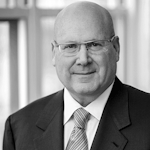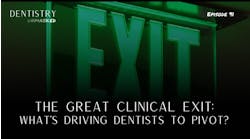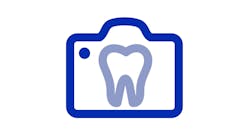“Organic growth” in the dental space is defined as expanding treatment plan options from within the practice—building on already existing capabilities and resources. How many existing patients have treatment needs that are just waiting in their charts?
It would be amazing if dentists had the time to search their records for all the treatment needs of every patient. To even come close, detailed information would have to be consistently collected and analyzed. It would be enlightening to also be able to check out diagnoses and treatment plans of other clinicians who have already seen patients with similar issues.
Imagine if patients could easily access their potential treatment and keep an eye on their wellness and hygiene care. Whether a sole practitioner or busy DSO, it would be a practice builder if dentists had this power of evidence-based treatment planning. Dentists no longer have to say “what if.” AI software and machine learning platform OraQ combines AI and technology that leads to more complete and evidence-driven patient care.
The process starts with the electronic intake form. The patient fills in personal information, medical/dental history, biometrics, preferences, and other customized information. OraQ AI analyzes the input and provides recommendations after evaluating seven areas of overall patient wellness, including medical risks, sleep-related risks, biomechanical risks (like cracks in teeth, overall wear patterns in the mouth), caries and periodontal risks, occlusion, and esthetics. Conversations about treatment can be started regarding these risk areas by the treatment coordinator, hygienist, dentist, or any member of the team.
If a clinician is not familiar with an unusual condition or is not fully confident, OraQ’s AI taps into the shared expertise of other OraQ practitioners to identify treatment strategies. Patients feel invested in the process because they can review their wellness profile and treatment plan in their secure patient portal, letting them see their oral health literally in the palm of their hands. Patients’ risk scores change in real time as they progress through treatment, so they can see results as they happen. They can discuss their overall wellness profile, risk scores, and future plans with the treatment team, from the hygienist to the dentist.
OraQ is integrated with major practice management systems such as Dentrix, Open Dental, Curve, and Eaglesoft. The compatibility allows them to assess existing patients and analyse key components of their existing charts such as medical and dental history and existing clinical and periodontal examinations. Dedicated portals provide appropriate information for the dental team, office management and patients.
OraQ’s founder, Dr. Amreesh Khanna, and his community of innovators are reimagining and redefining comprehensive diagnostics and treatment planning with this AI-powered clinical decision support system. Clinical studies have seen treatment plan acceptance rise from 40% to 70%. Before any dentistry can start, some complicated decisions have to be made by the patient, the dentist, and the hygienist. OraQ brings this wealth of information to the fingertips of the whole dental team while integrating the patients interests simultaneously.
Editor's note: The article appeared in the May 2024 print edition of Dental Economics. Dentists in North America are eligible for a complimentary print subscription. Sign up here.
Lou Shuman, DMD, CAGS, is the CEO of Cellerant Consulting Group, dentistry’s leading corporate incubator and accelerator. He is a venturer-in-residence at Harvard’s i-Lab, cofounder of LightForce Orthodontics, a member of the Dental Economics advisory board, and founder of the Cellerant Best of Class Technology Awards. He was selected in 2021 by Global Summits Institute as one of the World’s Top 100 Doctors.









